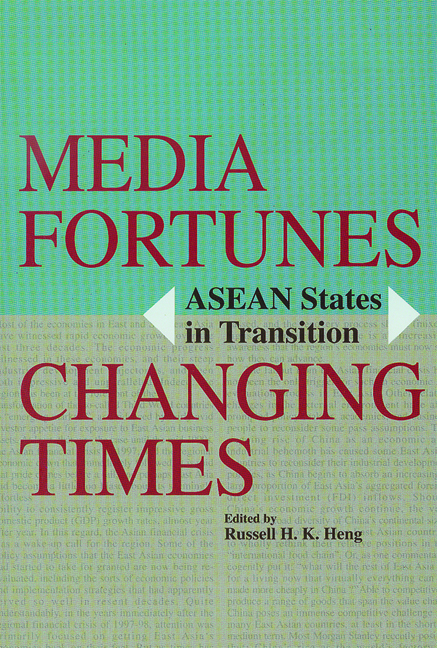Book contents
- Frontmatter
- Contents
- Foreword Wolfgang Möllers
- Acknowledgements
- Contributors
- Introduction
- Chapter 1 Media in Southeast Asia: A Literature Review of Post-1980 Developments
- Chapter 2 Cambodian Media in a Post-Socialist Situation
- Chapter 3 Industrialized Media in Democratizing Indonesia
- Chapter 4 Indonesian Television and the Dynamics of Transition
- Chapter 5 The Impact of Economic Transition on the Media in Laos
- Chapter 6 The Media and Malaysia's Reformasi Movement
- Chapter 7 Myanmar Media: Meeting Market Challenges in the Shadow of the State
- Chapter 8 Singapore: Media at the Mainstream and the Margins
- Chapter 9 Offending Images: Gender and Sexual Minorities, and State Control of the Media in Thailand
- Chapter 10 Vietnamese Media in Transition: The Boon, Curse, and Controversy of Market Economics
- Index
Foreword Wolfgang Möllers
Published online by Cambridge University Press: 03 November 2017
- Frontmatter
- Contents
- Foreword Wolfgang Möllers
- Acknowledgements
- Contributors
- Introduction
- Chapter 1 Media in Southeast Asia: A Literature Review of Post-1980 Developments
- Chapter 2 Cambodian Media in a Post-Socialist Situation
- Chapter 3 Industrialized Media in Democratizing Indonesia
- Chapter 4 Indonesian Television and the Dynamics of Transition
- Chapter 5 The Impact of Economic Transition on the Media in Laos
- Chapter 6 The Media and Malaysia's Reformasi Movement
- Chapter 7 Myanmar Media: Meeting Market Challenges in the Shadow of the State
- Chapter 8 Singapore: Media at the Mainstream and the Margins
- Chapter 9 Offending Images: Gender and Sexual Minorities, and State Control of the Media in Thailand
- Chapter 10 Vietnamese Media in Transition: The Boon, Curse, and Controversy of Market Economics
- Index
Summary
ASEAN has been undergoing a tremendous change in the last decade. Just as the region has diverse cultural and political systems, the Southeast Asian media scene is no different. It ranges from the very free in the Philippines to those strictly following party lines as in Vietnam, Laos and military-ruled Myanmar. Is the nature of the media industry highly dependent on the power of media practitioners or does the state have greater control over it instead? Although it is ideal to believe that the pen is mightier than the sword, in reality the governments in most of the ASEAN countries have greater control. However, media ownership and market dynamics also play a role in defining the position of media in the region.
In some ASEAN countries, governments view media as a tool of national development. Yet in others, media practitioners are not protected and are constantly putting their lives in danger when they report what they believe to be true. In more press-liberal countries like the Philippines and Thailand, media has become a toy of the owners, usually big business groups or politicians who serve their private agendas. Sometimes the media itself lacks a clear concept and direction, making it unreliable, irresponsible and corrupt.
The original ASEAN members who have experienced a higher level of economic development have better media technology, both print and satellite, and are now embracing multimedia. The newer members are still struggling with limited television and radio coverage in rural areas. New technologies pose new challenges for ASEAN governments. Direct satellite broadcasting has increased significantly and foreign-owned media broadcasts are easily accessible today. Technological breakthroughs together with public demand are making it difficult for the governments to restrict access to international information.
The Institute of Southeast Asian Studies, with the support of the Konrad-Adenauer-Stiftung, initiated the workshop on “Media and Transition in ASEAN”. This book, which analyses the position of media in a changing region, is a result of the contributions of eleven researchers covering eight countries. The position of the media in each country is unique and thus the results should be analysed bearing in mind the developments influencing the economic, social and political environment in the respective countries.
- Type
- Chapter
- Information
- Media Fortunes, Changing TimesASEAN States in Transition, pp. viiPublisher: ISEAS–Yusof Ishak InstitutePrint publication year: 2002



